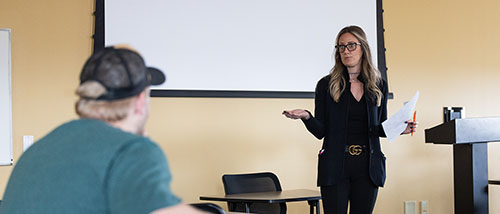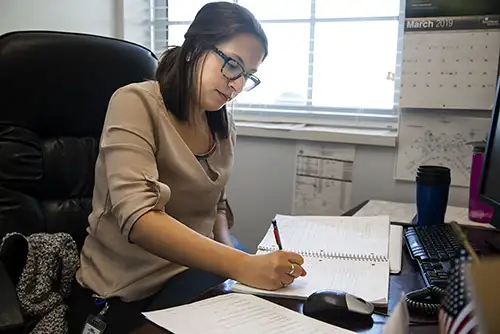Criminal Justice Program
Continue to main content
Criminal Justice Program Careers & Outcomes
-
$79k
Police and Detective
According to the Bureau of Labor Statistics, the median annual salary for police and detectives is $79,320.
-
$71k
Probation Officer
According to the Bureau of Labor Statistics, the median annual salary for probation officers and correctional treatment specialists is $71,530.
-
$86k
Court Reporter
According to the Bureau of Labor Statistics, the median annual salary for a court reporter is $86,220.
The criminal justice major curriculum includes core coursework to prepare you for a career in criminal justice. Complete a minimum of 120 credit hours to complete this degree, including the general education requirements and at least 39 senior division hours.
48 hour major – No minor required
Required Courses – 27 hours:
- CJ100 Introduction to Criminal Justice (3)
- CJ240 Principles of Law Enforcement (3)
- CJ250 Corrections (3)
- CJ321 Criminal Law (3)
- CJ370 Juvenile Justice (3)
- CJ425 Planning and Research in Criminal Justice (3)
- CJ499 Senior Seminar (3)
- SO305 Convergences of Crime (3)
- SO360 Criminology (3)
Electives - 21 hours, to include 3 hours of experiential learning:
- CJ303 Correctional Institutions (3)
- CJ330 Criminal Investigations (3)
- CJ350 Criminalistics (3)
- CJ365 Community-Based Corrections (3)
- CJ375 Victimology (3)
- CJ400 Crisis Management (3)
- CJ410 Police Administration (3)
- CJ422 Criminal Procedures (3)
- CJ435 Special Topics (3)
- CJ440 Offender Rehabilitation (3)
- CJ471 Directed Research (3)*
- CJ480 Travel Study (1-6)
- CJ491 Internship in Criminal Justice (3)*
- CJ495 Law Enforcement Professional Practice (18)**
- CJ505 Social Inequalities (3)
- CJ510 Comparative Criminal Justice Systems (3)
- CJ519 Restorative Justice (3)
- CJ520 Law and Social Control (3)
- CJ522 Critical Analysis of Gangs in America (3)
- CJ525 Crime and Criminal Justice Policy (3)
- CJ540 Professional Standards (3)
- CJ541 The Death Penalty in America (3)
- SO444 Deviant Social Behavior (3)
- UI300 Drugs and Behavior (3)
- UI309 Crime and Human Behavior (3)
- CJ471 Directed Research (3)*
- CJ491 Internship (3)*
- CJ480 Travel Study (1-6)
- CJ495 Law Enforcement Professional Practice (18)**
- Any university course earned through CPL (Credit for Prior Learning)
*No more than 3 credits of Directed Research (CJ471) and no more than 6 credits of Internship (CJ491) may be counted toward degree.**Students who demonstrate successful completion of a state-certified Police Academy at a Missouri Basic Law Enforcement Training Center and pass the Missouri Peace Officer License Exam (MPOLE); an out of state, federal, or military Basic Police School and Peace Officer Standards and Training (POST) exam; or, equivalent will earn 18 credits in CJ 495 toward their Bachelor of Science in Criminal Justice.
Some requirements may be fulfilled by coursework in major program.
- Social and Behavioral Sciences – 6 hours
- Constitution Requirement – 3 hours
- Written Communication – 6 hours
- Oral Communication – 3 hours
- Natural Sciences – 7 hours (from two disciplines, one to include a lab)
- Mathematics – 3 hours
- Humanities & Fine Arts – 9 hours (from at least two disciplines)
- Additional requirements – 5 hours (to include UI100 for native students)
- Civics examination
First Year
Fall Semester (16 Hours)
- UI100 (1)
- EN100 (3)
- CJ100 (3)
- General Education (3)
- General Education (3)
- General Education (3)
Spring Semester (15 Hours)
- CJ240 (3)
- General Education (3)
- General Education (3)
- General Education (3)
- General Education (3)
Milestone: 2.0 cumulative grade point average.
Second Year
Fall Semester (15 Hours)
- CJ115 (3)
- CJ321(3)
- General Education (3)
- General Education (3)
- General Education (3)
Spring Semester (15 Hours)
- SO305 (3)
- SO360 (3)
- General Education (3)
- General Education (3)
- General Education (3)
Milestone: 2.0 cumulative grade point average.
Second Year
Fall Semester (15 Hours)
- CJ370 (3)
- CJ Elective (3)
- CJ Elective (3)
- Elective (3)
- Elective (3)
Spring Semester (15 Hours)
- CJ425 (3)
- CJ Elective (3)
- CJ Elective (3)
- Elective (3)
- Elective (3)
Milestone: 2.0 cumulative grade point average.
Fourth Year
Fall Semester (14 Hours)
- CJ Elective (3)
- CJ Elective (3)
- Elective (3)
- Elective (3)
- Elective (2)
Spring Semester (15 Hours)
- CJ499 (3)
- CJ Elective (3)
- Elective (3)
- Elective (3)
- Elective (3)
Milestone: 2.0 cumulative grade point average.
Our course descriptions can be found on the Courses Page. This page lists all courses including criminal justice courses with their details to help you plan your studies.
The Criminal Justice Department offers courses on a two-year rotating schedule. To see when each course is available (spring, fall, first 8 weeks, second 8 weeks, or online), please check the Criminal Justice Course Rotation. This will help you plan when to take your classes.
What will it cost?
Experiential Learning
100% of our Social Work, Criminal Justice, and Sociology students graduate with real-world experience. They don’t just learn theories—they apply them, making a real impact before they even earn their degree.
Criminal Justice Master’s Degree
SEMO offers a Criminal Justice master’s degree and dual credit for current students. You can get both undergraduate and graduate credit for some 500+ level courses, meaning you can graduate your Master's program sooner.
Get Funding for Your Education
Missouri’s opened the door to a more educated workforce. We want to help you walk through it. If you’re an adult learner and a Missouri resident returning to college, learn about the Fast Track Workforce Incentive Grant. It’s a statewide financial aid program that can be used to pursue a certificate, degree or industry-recognized credential in a high need area in Missouri. This major is eligible for the Fast Track grant.
Missouri National Guard Criminal Justice
Your path to a serious career starts here. MONG provides real support for students committed to criminal justice. We bridge academic training with hands-on experience, offering educational benefits that turn your goals into reality. Earn while you learn.
SEMO Blog
Check out our blogs and learn what makes SEMO's Criminal Justice programs stand out! Our expert teachers bring real-world experience to your classes. Read stories about our faculty and discover how they're helping students like you prepare for exciting careers in law enforcement and criminal justice!
Become a Redhawk.
Do more than dream about the future. Take the first steps to make it all happen.
Getting the Job
Your education is just one piece to launching an extraordinary career. Once you’ve mastered the material, you still have to find the job you want, make the right connections, and sell your knowledge and experience—if all this is giving you anxiety, don’t panic. SEMO’s Career Services office is here to help you with the next step. Our boldly supportive faculty will provide the expertise and support you need, so you’re landing your dream job in no time.
Your Success, Our Priority
Got questions? Our faculty are here to help! Whether you're trying to pick the right major, need career advice, or want to understand more about our programs, we're just an email or call away. No question is too big or small – we're your personal roadmap to success.
Cape Girardeau, Missouri 63701


